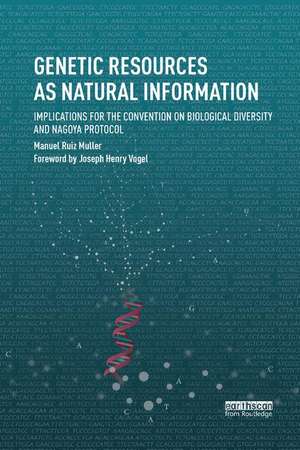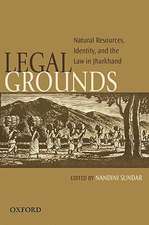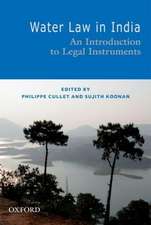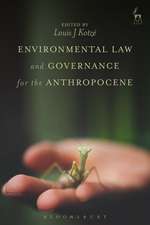Genetic Resources as Natural Information: Implications for the Convention on Biological Diversity and Nagoya Protocol: Routledge Studies in Law and Sustainable Development
Autor Manuel Ruiz Mulleren Limba Engleză Paperback – 26 oct 2017
Through a legal analysis that also incorporates historic, economic and sociological perspectives, the book argues that genetic resources are not tangible resources but information. It shows that the existing preference for bilateralism and contracts reflects resistance on the part of many of the stakeholders involved in the CBD process to recognize them as such. ABS issues respond very well to the economics of information, yet as the author explains, these have been either sidelined or overlooked.
At a time when the Nagoya Protocol on ABS has renewed interest in feasible policy options, the author provides a constructive and provocative critique. The institutional, policy and regulatory framework constitute "bounded openness" under which fairness and equity emerge.
| Toate formatele și edițiile | Preț | Express |
|---|---|---|
| Paperback (1) | 440.77 lei 6-8 săpt. | |
| Taylor & Francis – 26 oct 2017 | 440.77 lei 6-8 săpt. | |
| Hardback (1) | 1106.81 lei 6-8 săpt. | |
| Taylor & Francis – 17 sep 2015 | 1106.81 lei 6-8 săpt. |
Preț: 440.77 lei
Nou
Puncte Express: 661
Preț estimativ în valută:
84.35€ • 87.95$ • 70.10£
84.35€ • 87.95$ • 70.10£
Carte tipărită la comandă
Livrare economică 21 martie-04 aprilie
Preluare comenzi: 021 569.72.76
Specificații
ISBN-13: 9780815378952
ISBN-10: 0815378955
Pagini: 138
Ilustrații: 15 Illustrations, black and white
Dimensiuni: 156 x 234 x 19 mm
Greutate: 0.25 kg
Ediția:1
Editura: Taylor & Francis
Colecția Routledge
Seria Routledge Studies in Law and Sustainable Development
Locul publicării:Oxford, United Kingdom
ISBN-10: 0815378955
Pagini: 138
Ilustrații: 15 Illustrations, black and white
Dimensiuni: 156 x 234 x 19 mm
Greutate: 0.25 kg
Ediția:1
Editura: Taylor & Francis
Colecția Routledge
Seria Routledge Studies in Law and Sustainable Development
Locul publicării:Oxford, United Kingdom
Public țintă
PostgraduateCuprins
Foreword: "On the Silver Jubilee of ‘Intellectual Property and Information Markets: Preliminaries to a New Conservation Policy’" Joseph Henry Vogel Introduction 1. The Relevant Nature of Genetic Resources: "Normal Science" Becomes "Paradigm Shift" 2. Regulatory Trends in ABS: Secrecy as the Enabler of the Bilateral Model 3. Sovereignty over Genetic Resources: The First Twenty Years of ABS 4. Resistance to Correction 5. "Bounded Openness" as Fair, Equitable and Efficient: The Path to a Global Multilateral Benefit Sharing Mechanism 6. Conclusions and Recommendations Case Study I: Epipedobates anthonyi under "Bounded Openness" Klaus Angerer Case Study II: Lepidium meyeni under "Bounded Openness" Omar Oduardo-Sierra
Recenzii
"With scientific capacity to sequence and manipulate genes increasing by the day, Ruiz's very timely book shows how current ABS concepts will soon be rendered obsolete and unworkable unless a way can be found to accommodate the reality that genetic resources are pure information, encoded in chemicals." – Pierre du Plessis, ABS expert, advisor and negotiator for the Government of Namibia.
"The challenge of adapting the ABS legal regime to the realities on the ground is well addressed in this book through rethinking classical notions of genetic resources and sovereignty, and the promotion of the innovative concept of 'bounded openness' which would allow facing genetic research developments." – Alejandro Iza, Head of the IUCN Environmental Law Centre, Germany.
"The implementation of access and benefit sharing under the international framework on genetic resources has been fraught with difficulties. Based on the economics of information, this book presents an alternative model intended to solve the conceptual and practical challenges so far faced. This is a refreshing contribution to a field where, despite the vast work done by academics, NGOs and governments, new ideas and approaches have been sparse." – Carlos Correa, Law Professor of the University of Buenos Aires and ABS expert, Argentina.
"The authors operationalize my idea of 'bounded openness' for genetic resources as natural information. They show how radically different sectors of intellectual property can learn much from one another. The report from the frontline is that the future of knowledge management need not be the same as its past!" – Christopher May, Author of The Global Political Economy of Intellectual Property.
"Manuel Ruiz’s powerful reminder to view genes as information underscores the need to further clarify the interface between intellectual property rules and fair, equitable and efficient access and benefit-sharing schemes. I strongly encourage intellectual property negotiators and policy-makers to read this thought-provoking book." – Wend Wendland, Director of the TK Division, WIPO.
"The challenge of adapting the ABS legal regime to the realities on the ground is well addressed in this book through rethinking classical notions of genetic resources and sovereignty, and the promotion of the innovative concept of 'bounded openness' which would allow facing genetic research developments." – Alejandro Iza, Head of the IUCN Environmental Law Centre, Germany.
"The implementation of access and benefit sharing under the international framework on genetic resources has been fraught with difficulties. Based on the economics of information, this book presents an alternative model intended to solve the conceptual and practical challenges so far faced. This is a refreshing contribution to a field where, despite the vast work done by academics, NGOs and governments, new ideas and approaches have been sparse." – Carlos Correa, Law Professor of the University of Buenos Aires and ABS expert, Argentina.
"The authors operationalize my idea of 'bounded openness' for genetic resources as natural information. They show how radically different sectors of intellectual property can learn much from one another. The report from the frontline is that the future of knowledge management need not be the same as its past!" – Christopher May, Author of The Global Political Economy of Intellectual Property.
"Manuel Ruiz’s powerful reminder to view genes as information underscores the need to further clarify the interface between intellectual property rules and fair, equitable and efficient access and benefit-sharing schemes. I strongly encourage intellectual property negotiators and policy-makers to read this thought-provoking book." – Wend Wendland, Director of the TK Division, WIPO.
Descriere
Through a legal analysis that also incorporates historic, economic and sociological perspectives, the book argues that genetic resources are not tangible resources but information. It shows that the existing preference for bilateralism and contracts reflects resistance on the part of many of the stakeholders involved in the Convention on Biological Diversity process to recognize them as such.














